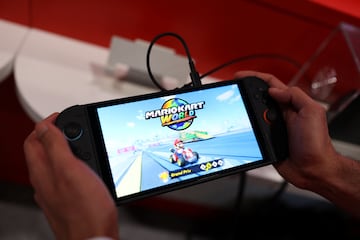Nintendo
Nintendo can disable your Switch 2 for piracy in the U.S., but not in Europe, as confirmed by its EULA
These differences in legislation cause Nintendo to punish piracy unequally depending on the territory.

In anticipation of the Switch 2 launch in June, Nintendo updated its end-user license agreements (EULAs) for consoles and other digital products. However, this binding contract between the company and its users differs greatly depending on the territory. While the legal framework in the United States allows Nintendo to disable a pirated console completely, in Europe, Nintendo can only prevent access to pirated software.
There is a significant legal difference between the United States and Europe that affects the Nintendo Switch 2 and piracy
When we purchase a video game console or a video game, we are subject to an EULA, which we tacitly accept by using this type of product. These legal documents are rarely read, but companies draw them up to protect themselves in case users misuse their products, such as pirating a video game console to access their video game library without paying.

Nintendo’s case for the June 5 launch of the Switch 2 is interesting because it highlights significant differences in the legal frameworks of the United States and Europe. The following can be read in the EULA for the United States:
“Without limitation, you agree that you may not (a) publish, copy, modify, reverse engineer, lease, rent, decompile, disassemble, distribute, offer for sale, or create derivative works of any portion of the Nintendo Account Services; (b) bypass, modify, decrypt, defeat, tamper with, or otherwise circumvent any of the functions or protections of the Nintendo Account Services, including through the use of any hardware or software that would cause the Nintendo Account Services to operate other than in accordance with its documentation and intended use; (c) obtain, install or use any unauthorized copies of Nintendo Account Services; or (d) exploit the Nintendo Account Services in any manner other than to use them in accordance with the applicable documentation and intended use, in each case, without Nintendo’s written consent or express authorization, or unless otherwise expressly permitted by applicable law. You acknowledge that if you fail to comply with the foregoing restrictions Nintendo may render the Nintendo Account Services and/or the applicable Nintendo device permanently unusable in whole or in part.”

The most relevant part is at the end of this EULA clause, where Nintendo reserves the right to disable Nintendo Switch 2 consoles if its strict rules are broken, including game piracy. However, this text is absent from the European EULA. The closest version reads as follows:
“Any Digital Products registered to your Nintendo Account and any updates of such Digital Products are licensed only for personal and non-commercial use on a User Device. Digital Products must not be used for any other purpose. In particular, without NOE’s written consent, you must neither lease nor rent Digital Products nor sublicense, publish, copy, modify, adapt, translate, reverse engineer, decompile or disassemble any portion of Digital Products other than as expressly permitted by applicable law. Such unauthorized use of a Digital Product may result in the Digital Product becoming unusable.”
In Europe, Nintendo can only block access to pirated Switch 2 games if it detects unauthorized access to certain titles. Under no circumstances could they block or brick the console, a term in video game slang that means the system is unusable. This significant legal difference does not mean that Nintendo cares less about piracy in Europe. Rather, it means that the legal framework in Europe is much more protective of users. The corresponding laws understand that disabling a device for unauthorized access to software is an excessive and illegal measure.
Follow MeriStation USA on X (formerly known as Twitter). Your video game and entertainment website for all the news, updates, and breaking news from the world of video games, movies, series, manga, and anime. Previews, reviews, interviews, trailers, gameplay, podcasts and more! Follow us now!


